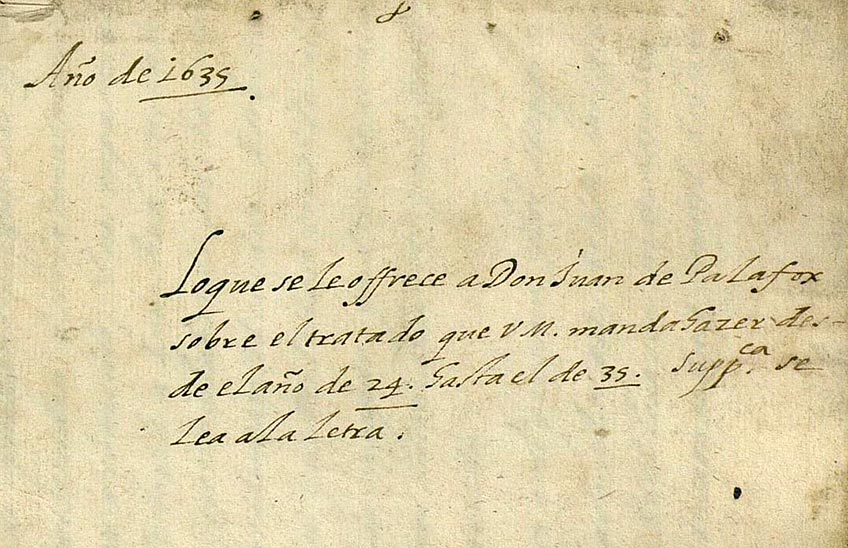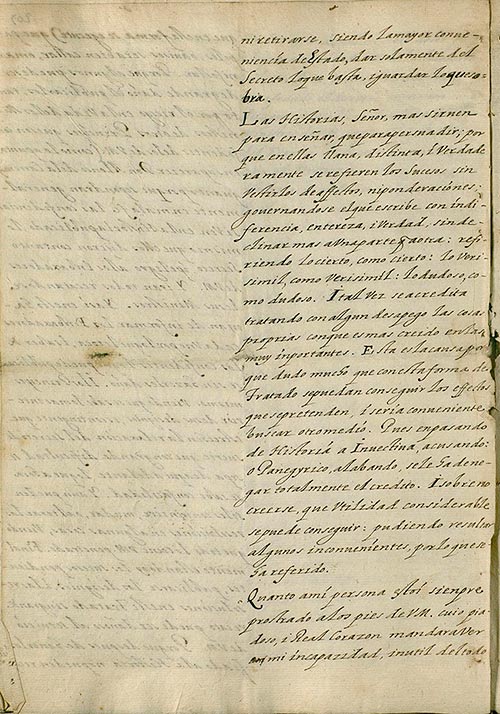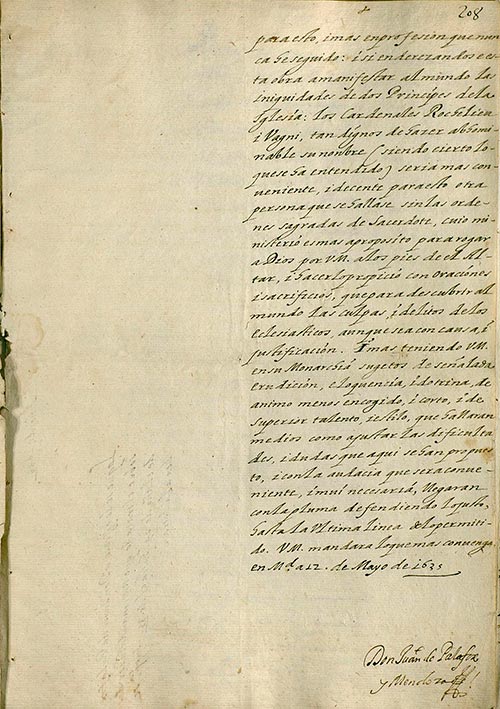History and the historian according to Juan de Palafox

"Histories, Sir, are more useful for teaching than for persuading, because in them the events are plainly, distinctly and truly referred to, without dressing them up in affection or pondering, the writer governing himself with indifference, integrity and truth, without inclining more to one side than the other; referring what is true as true; what is plausible as plausible; what is doubtful as doubtful; and perhaps he is accredited by treating his own things with some detachment, with which he is more credible in the very important ones. This is the reason why I doubt very much that with this form of Treatise the effects intended can be obtained, and it would be convenient to look for another means, because in passing from history to invective, accusing, or panegyric, praising, the credit must be totally denied. And it is not believed that considerable usefulness can be achieved, and some inconveniences may result from what has been referred to".
With this categorical paragraph, worthy of being included in manuals on the methodology of history and historiography, Don Juan de Palafox, then Councillor of the Indies, expressed himself in a still unpublished report , addressed to Philip IV and dated 12 May 1635. The original is kept among his papers (file Infantado, Palafox, leg. 87, no. 143). In it he advocates objectivity, a certain indifference and, above all, adherence to the truth for the historian. These are issues that he sets out with authority, categoricalness and clear-sightedness.
With these arguments he reasoned, responding to a enquiry that Philip IV had sent him. The king asked him for his opinion on a text to be published on the events that took place between 1624 and 1635 in European politics, especially in relation to France and the German and Italian territories. Aware that what he had written was the fruit of long reflection, he asked that it be read verbatim.
The context was that of an impending war with France, allied with anti-Spanish interests in Italy. Shortly before, Urban VIII, anxious to rid himself of Spanish hegemony in Italy, had relied on Richelieu to bring French troops back to Italian soil. In 1632, Cardinal Borgia had denounced Urban VIII's disloyalty to the Spanish monarchy, accusing him of serving France and colluding with heretics.

Folio from report of 1635 with the considerations on the history of Juan de Palafox.
Focusing on Palafox's ideas on the project edition of the manifesto, we can see how his seasoned reflections emerge after reading what had been written by Alonso Guillén de la degree program, polemicist, ambassador and university professor; Francisco de Calatayud, poet and trusted man of Olivares; and José de Nápoles. In summary, Palafox states, with great perspicacity, that one should not directly attack the Holy See and its closest collaborators in their policy that was not favourable to Spanish interests, as it could be counterproductive. Whether certain facts were made public or those responsible for them, there was little to be gained, a fortiori when it was necessary to name a whole host of spies and informers. After a mature examination of the facts, he was sample more in favour of informing the embassies in order to cut off from plenary session of the Executive Council the possible aspirations to the papal throne of Cardinal G. F. Guidi di Bagno, former nuncio in Paris who, incidentally, in the illness of Urban VIII in 1637, was one of Richelieu's bets.
In his reply to the monarch, he pointed out his lack of suitability to write the memorial for publication, as he was a priest and had to enter into questions in which he would have to make harsh criticism of the policy of the Holy See and of people such as the aforementioned Cardinal di Bagno. This is how he argues his opinion: "It would be more suitable and decent for this purpose another person without the sacred orders of a priest, whose ministry is more at purpose to pray to God for your Majesty at the foot of the Altar and to make him propitious with prayers and sacrifices, than to reveal to the world the faults and crimes of the ecclesiastics, even with cause and justification, and more so, having your Majesty in your monarchy subjects of notable erudition, eloquence and doctrine, of a less shrunken and short mind and of superior talent and style, who will find means how to adjust the difficulties and doubts that have been proposed here, and with the audacity that will be convenient and very necessary, they will go with the pen defending what is just to the last line of what is permitted. Your Majesty will order what is most convenient".
A few days after Palafox signed the document, the Count-Duke was in favour of publishing a text addressed to the European princes and the pope, as well as manifestos to be distributed in France. For this purpose, he appointed Palafox himself, among others. Spanish polemicists defended the war as defensive. The Count-Duke undoubtedly saw the necessity of the conflict. On 14 June 1635, preparations were made for the war, which Louis XIII had already declared in March.
Returning to the beginning and to the paragraph dedicated to history, with which we opened this text, Palafox was sample in tune with what Tacitus had written centuries earlier, when he called on the historian to look at the past "sine ira et studio", without animosity or favouritism. He must have come to Tacitus through the works of Seneca, well known to him and his generation through the Flemish humanist Justus Lipsius, who introduced neo-Stoicism to a good group of intellectuals of the time. Soledad Arredondo has also pointed out some paragraphs in Palafox's works in which tacitism and senecism are seen in conjunction, as in allusions to prudence, austerity and the repudiation of luxuries and vices advised to kings, or the need to defend oneself with legitimate means in adversity.

Final page of report of 1634 with the signature of Juan de Palafox.
To find out more
ARREDONDO, S., "Diálogo, diario, historia, juicio, dictamen: géneros y estilo en la prosa política de Juan de Palafox y Mendoza", Revista Internacional d'Humanitats (2014), pp. 19-36.
CANTARINO, E., "Justo Lipsio en España: Humanismo, Neoestoicismo y Tacitismo", Hacia un inventario de la ciencia española. IV conference de Hispanismo Filosófico, Santander, association de Hispanismo Filosófico -Sociedad Menéndez Pelayo, 2000, pp. 77-84.
ELLIOTT, J. H., El conde-duque de Olivares, Barcelona, publishing house Crítica, 1990.
FERNÁNDEZ GRACIA, R., Los Dictámenes de Juan de Palafox. Con todos hablan en general y con cada uno en particular, New York, high school de programs of study Auriseculares, 2015
